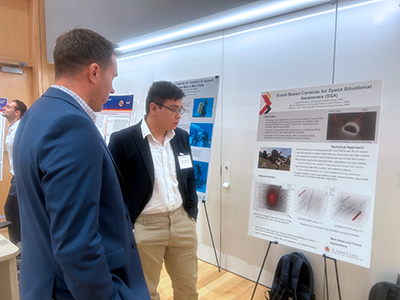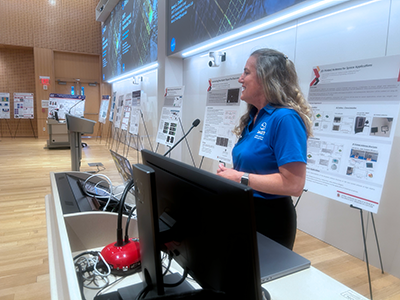
|
 |
The ASTRA-UMD Maryland Space Technology Showcase featured a poster session in which faculty and students involved in space-related research, including recipients of joint UMD/JHU-APL seed grants, presented their work. |
|
Maryland’s contributions to space exploration and research were highlighted on Oct. 15 during an event organized by the Center for Advanced Science and Technology Research at the University of Maryland (ASTRA-UMD), a research hub based at the Department of Aerospace Engineering and led by Professor Christine Hartzell.
The inaugural Maryland Space Technology Showcase featured a poster session in which faculty and students involved in space technology-related projects, including recipients of joint UMD/Johns Hopkins University-Applied Physics Laboratory (JHU-APL) seed grants, presented their work.
More than 25 space technology related research projects from across campus were showcased by presenters from the Departments of Aerospace Engineering, Astronomy, Electrical Engineering, Geology, and Mechanical Engineering. Featured projects covered the gamut from seismicity instruments that will be deployed on the lunar surface to astrodynamics, autonomy, battery technology, and space robotics.
External guests included Chief Technologists from JHU-APL’s Space Sector, the Maryland Department of Commerce, and local small space businesses.
Nancy Chabot, Johns Hopkins University Applied Physics Laboratory (JHU-APL) Chief Scientist, Space Exploration Sector, provided an overview of the 2022 Double Asteroid Redirection Test, for which she served as coordination lead.

Nancy Chabot, Johns Hopkins University Applied Physics Laboratory (JHU-APL) Chief Scientist, Space Exploration Sector, provided an overview of the 2022 Double Asteroid Redirection Test, for which she served as coordination lead.
A keynote presentation at the event was given by Nancy Chabot, JHU-APL Chief Scientist, Space Exploration Sector. Dr. Chabot was the coordination lead on the National Aeronautics and Space Administration’s (NASA) Double Asteroid Redirection Test (DART) mission, in which the space agency intentionally crashed a probe into a moon orbiting the asteroid Didymos. This successful 2022 mission demonstrated that such procedures can be used to change the orbit of asteroids that are on a collision course with Earth.
Dr. Chabot provided an exciting overview of the mission, complete with graphics and animations, and discussed the probabilities of collision events at various scales as well as the steps scientists and engineers are taking to identify and mitigate these hazards.
Currently, Dr. Chabot is the deputy principal investigator for the Mars-moon Exploration with GAmma rays and NEutrons (MEGANE) instrument on the Japanese Aerospace Exploration Agency’s (JAXA) Martian Moon eXploration mission. In addition, she is an interdisciplinary scientist on the joint European Space Agency-JAXA BepiColombo mission. On NASA’s Mercury Surface, Space Environment, Geochemistry and Ranging mission, she was the instrument scientist for the Mercury dual imaging system and the chair of the Geology Discipline Group. She has been a member of five field teams with the Antarctic Search for Meteorites program.
October 29, 2025
|

